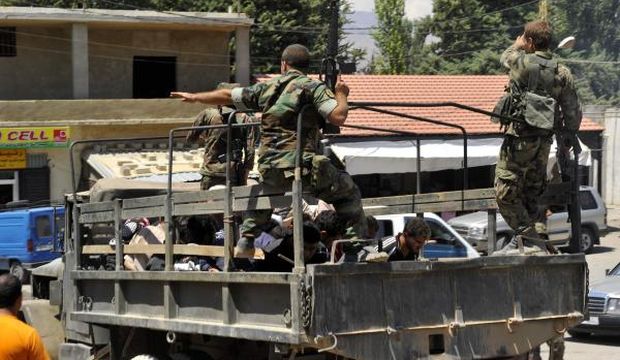
Lebanese army soldiers ride in a pick-up military vehicle with detained suspects from Arsal, in Labwe in the eastern Beqaa Valley, Lebanon, on August 6, 2014. (Reuters/Hassan Abdallah)
Beirut, Asharq Al-Awsat—Fears of a resurgence of violence in the Lebanese border town of Arsal grew over the weekend, following the return of the body of a resident, Kayed Ghadadah, who was shot dead by the Islamic State of Iraq and Syria (ISIS) on the outskirts of the town.
The town, located on the Lebanese–Syrian border, was the scene of clashes between the Lebanese armed forces and Syria-based rebels from ISIS and the Al-Nusra Front, in one of the most serious examples of spillover from the conflict in Syria into its smaller neighbor to date.
Both Al-Nusra and ISIS, and the Lebanese government and Hezbollah, have all issued lists of residents they accuse of collaborating with opposing sides during the fighting in August, which reportedly killed 20 Lebanese soldiers, 16 civilians, and scores of insurgents.
Ghadadah was reportedly kidnapped from his home in Arsal by ISIS last week. His body was returned on Thursday after he was executed by the organization, which claimed he had been assisting Hezbollah.
As well as the killing of a resident by ISIS, a Twitter account linked to the Al-Nusra Front recently announced the “detention of collaborators of Iranian Hezbollah,” in the Arsal area, and published a video of two people who claimed to be Syrians in the pay of Hezbollah, and who said they had received training from the organization.
Hezbollah has fought in Syria on behalf of President Bashar Al-Assad, whom ISIS and Al-Nusra are battling to overthrow.
A senior source from the town, speaking on condition of anonymity, told Asharq Al-Awsat: “Hundreds of families have left Arsal for fear of being kidnapped by ISIS and also due to the recession which has paralyzed the town recently.”
The source added that those wanted by ISIS and Nusra were seen as “traitors who must be killed, because they opposed their violations and the presence of [armed fighters] in the town, and they opposed the arrival of insurgents in Arsal during the clashes.”
The town’s mayor, Ali Al-Hujairi, told Asharq Al-Awsat that those who left the town were mostly people who owned property in Beirut or could afford to pay rent in the capital. He said some of those who left “feared for their lives because they worked for Hezbollah.”
“Some Syrian nationals and local residents are wanted by the armed groups for working for Hezbollah during the clashes and firing at the army and the Syrians to cause sedition,” while in turn, “a number of people are wanted by the Lebanese government and Hezbollah for collaboration with the insurgents,” he said.
Meanwhile, an ISIS twitter account announced on Saturday the killing of another Lebanese soldier captured by the group during the fighting in Arsal.
The announcement came a few hours after the return of a Qatari mediator from talks with the group with ISIS and Nusra’s list of demands on Friday. The kidnappers demanded the release of Islamist prisoners in the Lebanese Roumieh Prison, and a cash ransom.
An ISIS commander said Lebanese soldier Abbas Madlaj was executed while attempting to escape. A Twitter account purported to be owned by Abu-Mossaab, the grandson of ISIS leader Abu-Bakr Al-Baghdadi, published photos of Madlaj with his hands tied, kneeling in front of the group’s flag, surrounded by five masked insurgents.
Another picture showed one of the insurgents holding the head of the Lebanese soldier while holding a bloody knife in the other. A third picture showed the decapitated head of the soldier placed on his back.
The organization executed another captive just over a week before. Both men were among a group of around two-dozen Lebanese army and Internal Security Force soldiers captured during the fighting in Arsal in August and believed still held by ISIS and Al-Nusra.

Trackbacks/Pingbacks